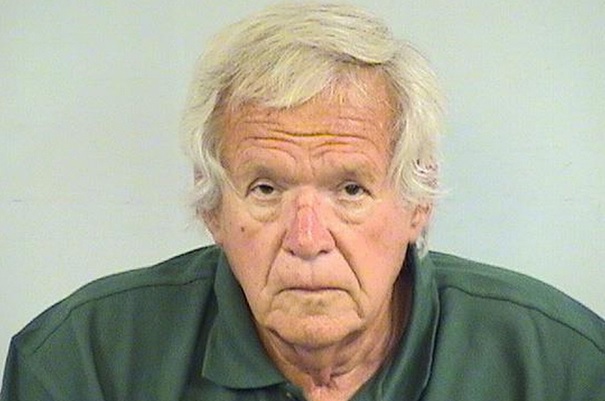
Twitter/@nypost Dennis Hastert (Twitter/@nypost)
On Tuesday, a federal judge ordered that former Speaker of the House Dennis Hastert never be left alone with anyone under 18. Here’s five things to know:
1. The Judge Called Hastert ‘A Serial Child Molester’

Former House Speaker Dennis Hastert arrives court for his hush-money case sentencing on April 27, 2016 in Chicago, Illinois (Getty)
The Associated Press reports that U.S. District Judge Thomas M. Durkin branded Hastert “a serial child molester,” citing at least four students he abused while coaching at Yorkville High School (in the suburbs of Chicago) from 1965 through 1981.
Last July, Hastert was released from prison under supervision. On Dec. 12, Judge Durkin issued additional conditions for Hastert. The Chicago Tribune reports that Hastert was forbidden form possessing any “pornographic, sexually oriented, or sexually stimulating materials, including visual, auditory, telephonic, or electronic media, computer programs, or services,” or patronizing businesses where these are available. He is also forbidden from calling “sex-related telephone numbers.”
The judge’s order also bars Hastert from contact with anybody younger than 18 “except in the presence of a responsible adult who is aware of the nature of his/her background and current offense.”
2. Hastert was the Longest-Serving GOP Speaker of the House
In February 2008, after Hastert had retired from Congress but years before Hastert’s former victims came forward to tell of his abusive behavior, the Daily Herald (“suburban Chicago’s information source”) ran a profile piece headlined “Hastert returns to his humble beginnings after historic career.”
Hastert was born in Aurora, Illinois in 1942 and grew up working on his family farm. He became a born-against Christian as a teenager and enrolled in Wheaton College, a Christian liberal arts school.
After college Hastert spent over a decade working at Yorkville High, teaching government and history classes in addition to coaching the school’s football and wrestling teams, before turning to politics. In 1980 he ran in a Republican primary for the Illinois House of Representatives and lost, though the party gave him the candidacy after the original candidate fell ill and dropped out of the race. Hastert won that election, and six years later was elected to the U.S. House.
He became the Chief Deputy Whip under then-Speaker of the House Newt Gingrich in 1995, then became Speaker after Gingrich stepped down in 1998. He remained Speaker until his retirement in 2007, making him the longest-serving Republican Speaker of the House in U.S. history.
3. Hastert was Convicted Over Hush-Money Payments, not Child Molestation
By the time Hastert’s victims (or family members thereof) came forward, the statute of limitations for sexual abuse had already run out, so Hastert could be neither charged nor prosecuted for those crimes.
Hastert was actually investigated and eventually imprisoned for banking crimes involving over a million dollars in hush-money payments to his former victims.
Hastert was also charged with lying to the FBI, claiming at one point that his bank withdrawals were to pay an extortionist falsely charging hm with sexual abuse. In his attempt to “prove” extortion, he agreed to let the FBI record his phone calls between him an someone identified in court documents as “Individual A,” and those calls led investigators to conclude sexual abuse had indeed taken place.
4. He Spent 13 Months in Federal Prison Before Moving to a Halfway House
In April 2016, Judge Durkin sentenced Hastert to 15 months in prison. At the time, Hastert said “I’m deeply ashamed to be standing before you today. I’m the one solely responsible for being here. I know I’m here because I’ve mistreated some of the athletes that I coached. … What I did was wrong and I regret it.”
That June, Hastert surrendered to authorities at a federal prison hospital in Minnesota. In July 2017, he was released to a halfway house in Chicago.
5. Before his own Crimes Were Known, Hastert Helped Cover up Another Congressman’s Sexual Misbehavior
As the Daily Herald reported in its otherwise-admiring 2008 profile of Hastert, years before Hastert himself was accused of having molested underage boys, he was soundly blasted for refusing to intervene after learning that his congressional colleague Mark Foley made sexual advances to underage male interns. A congressional ethics subcommittee criticized Hastert for attempting to “shift notice and responsibility” away from Foley.
However, as the Daily Herald reported in 2008, “Hastert contends he and other Republican leaders ‘did what we could with what we knew.'”